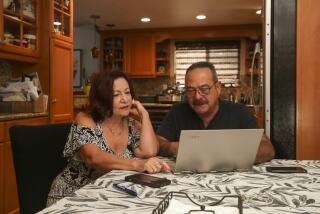AIDS took a toll on his financial health
Michael Sausser, 45, never planned for retirement. Doctors diagnosed him with AIDS almost 20 years ago. His first symptoms of the full-blown disease -- AIDS-related dementia -- indicated the end was near. A doctor gave him two months.
But two decades later heâs still here. The dementia comes and goes. Survival hasnât been easy, and Sausser has taken as many as 35 drugs a day to stay alive.
The disease has also ravaged his finances.
Sausser gets about $4,000 a month from a disability insurance policy and Social Security, and $1,000 a month in rental income from a guesthouse at his Van Nuys home.
But he spends about $8,000 a month on living expenses, largely because of home repairs and big out-of-pocket medical costs. Thatâs deficit spending to the tune of $3,000 a month.
Sausser has managed to stay afloat so far by drawing down his home equity line of credit and maxing out his credit cards. But he wonât be able to play this shell game much longer.
Heâs down to $12,000 on his home equity credit line. And he owes nearly $35,000 on his seven credit cards.
Financial planner Delia Fernandez sat down to untangle the mess with Sausser and his partner, Rodrigo Rodarte, also a longtime AIDS survivor, who maintains a separate home.
After friendly chitchat in her Los Alamitos office, Fernandez spelled out the bottom line in gentle tones. âYou have about two to three monthsâ worth of cash and thatâs it,â she said.
âIâve been putting my head in the sand,â Sausser admitted.
âI completely understand that when times are terrible,â the planner allowed. âYouâve got a nice amount of income, but you spend more than you make.â
The disease makes it impossible for him to resume the 9-to-5 schedule of his former career as a city planner, though he has taken real estate investment courses. But going to five to 10 doctorsâ appointments a week eats into his schedule, and his cognitive struggles make any kind of investing a shaky proposition.
Fernandez says the first order of business is for Sausser to cut his expenses.
She found that 83% of Sausserâs monthly income goes to fixed expenses related to the house. The mortgage and equity line payment exceed $3,200. Taxes, insurance and repairs add $1,000 more.
âThatâs a huge amount,â Fernandez said, a far greater percentage than she advises. For younger people, she recommends no more than 40% to 45% of their gross income for housing. For Sausser, she prefers 25% to 30% because of the high cost of his medical care.
Sausser can see where this conversation is heading. He tells Fernandez that he has considered selling the Van Nuys house, which is worth an estimated $600,000, and buying a three-bedroom condominium in Palm Springs for about $250,000.
Fernandez quickly endorses that idea.
âI know youâve worked really hard on this house, but the house is taking over,â Fernandez said.
If Sausser bought a condo for $250,000 at 6.25%, with a 20% down payment of $50,000, Fernandez estimated, he would halve his current monthly payments, bringing them to $1,656. That includes condominium association fees, taxes and homeownerâs insurance. He also would eliminate the cost of a gardener, pool service and his biggest home repair bills.
At that level, his fixed housing-related costs would be 42% of his income.
âThatâs very good,â Fernandez said. âWeâre headed in the right direction.â
Another way to save money would be to give one or two of his pets to caring homes. Sausser has two dogs and three cats, all rescues. A charity for pet owners with AIDS pays for some of the animalsâ food, but Sausser still finds himself paying high bills to the veterinarian. A recent trip for one of his cats cost $500.
Sausser balks at shedding his pets.
âIâve done so well because of the animals and the love theyâve given me,â Sausser said. âI feel I come from a distressed situation like them.â
âThe parallels are clear,â Fernandez said. âBut you need to take care of yourself first.â
Sensing no movement, she punted: âI think it might be wise to not take care of any more new family members.â
Spending too much
Pets werenât the only discretionary expenses in Sausserâs portfolio, however.
Last year he bought a time share in Florida out of foreclosure for $7,000, and this year he bought another foreclosed time share in Palm Springs for $6,000.
Sausser plans to sell both. He said his broker in Florida told him the time share there should sell for more than $20,000, and he hopes the Palm Springs property should do about the same.
Fernandez is skeptical, given the soft market for real estate and vacation property. If he can make that kind of profit, she said, âEveryone will want to know what youâve done.â
Sausser has also spent heavily to renovate his home. The modest two-bedroom house, with a large pool, cost $289,000 in 2002. As the value rose, he borrowed $200,000 against the equity.
He has spent about $130,000 on improvements. About $30,000 went for work on the main house and $100,000 went to convert his garage to a guesthouse that he recently rented out.
He also regrets the $30,000 he estimates he has spent over the years to attend real estate investment seminars around the country. That amount includes enrollment fees, books and CDs.
âThose real estate guys used you to line their pockets,â Fernandez told Sausser. The planner insisted that he not spend another dime to study real estate investing.
On the medical front, Sausser often pays large sums to keep at bay a long list of serious ailments related to his disease, including replacement of both hips and nerve damage to his limbs. Insurance covers up to $20,000 of his medical costs a month. But much of his care isnât covered.
With no dental insurance, he paid out of pocket for reconstructive work after AIDS weakened the bones under his gum line, causing periodontal disease. His bills for that were about $35,000.
Itâs not unusual for Sausser to wake up and find that another tooth has fallen out, leaving a gap in his mouth. And his wallet. Replacements cost about $3,500.
âSometimes I could just cry,â he said.
He uses credit cards to pay for these and other expenses. Fernandez supported Sausserâs idea to consider a debt consolidation loan from his credit union. She calculated that he could reduce by $300 the $1,000 he pays monthly to credit card companies.
Insurance income
On the positive side of the equation, Sausser gets tax-free income. Social Security pays him $1,360 a month in disability benefits, and he has a disability insurance policy from Equitable that pays $2,616 a month.
Sausserâs Equitable policy was written at a time when AIDS victims were not expected to live very long, and the terms are generous, said West Hollywood-based insurance broker Alison Gordon, who advises longtime AIDS survivors on insurance benefits.
He will continue getting the payments for life as long as he remains unable to perform the tasks of his previous profession. But the policy does stipulate that if, by age 55, he is able to earn an income by another means, the benefits will end. That does mean, however, that he can work for the next 10 years without any effect on his benefits.
Sausser said he was willing to go back to work. Fernandez said it would help if Rodarte could bring in more income because Rodarte works sporadically and Sausser covers a portion of his partnerâs expenses.
Both Gordon and Fernandez advised that Sausser seek further legal advice to ensure that he remains in compliance with the terms of the insurance policy and Social Security program.
Fernandez forbade him from adding to his debt. If he does manage to make a profit by selling his time shares, he must use the proceeds to pay down the credit cards with the highest interest rates.
Sausser also needs a will and an advance healthcare directive. Fernandez suggests that he put his home and other assets into a living trust to avoid probate.
The planner said she appreciated the difficulty Sausser faced. âYouâre too well to go into a group home,â she said. âYou make too much money to go into low-income housing. Youâre just a man in between.â
But by taking action, Sausser has time to make key changes.
âIâm really proud of you for taking action to save yourself,â Fernandez told him.
Do you need a money makeover? Each month the Sunday Business section gives readers a chance to have their financial situations sized up by professional advisors at no charge. To be considered, send an e-mail to makeover@ latimes.com. Include a brief description of your financial goals and a daytime phone number. Information you send us will be shared with others.
--
(BEGIN TEXT OF INFOBOX)
This monthâs makeover
Who: Michael Sausser
Income: $5,000 a month, including $1,360 from Social Security and $2,616 from a disability insurance policy.
Financial goals: Reduce expenses and increase income. Plan for retirement. Decide whether to continue investing in real estate. Evaluate a potential move to Palm Springs.
Assets: $100,000 in equity on a Van Nuys home. Two vacation time shares, value unknown.
Debt: $500,000 in a mortgage and home equity line on his primary residence. $35,000 in seven credit cards. $11,800 on time shares.
Recommendations: Sell the Van Nuys home to reduce expenses. Buy a condominium in Palm Springs for $250,000. Find part-time work that requires no upfront investment. Sell time shares and use any profit to pay off credit cards with the highest percentage rates. Find caring homes for one or two of five pets and refrain from adopting more animals. Take out a debt consolidation loan to pay down credit cards and reduce monthly payments. Get good legal advice to remain in compliance with disability insurance terms. Do not take on new credit card debt. Eat in more.
--
About the planner: Delia Fernandez is a fee-only financial planner and the founder of Fernandez Financial Advisory in Los Alamitos.
More to Read
Inside the business of entertainment
The Wide Shot brings you news, analysis and insights on everything from streaming wars to production â and what it all means for the future.
You may occasionally receive promotional content from the Los Angeles Times.










